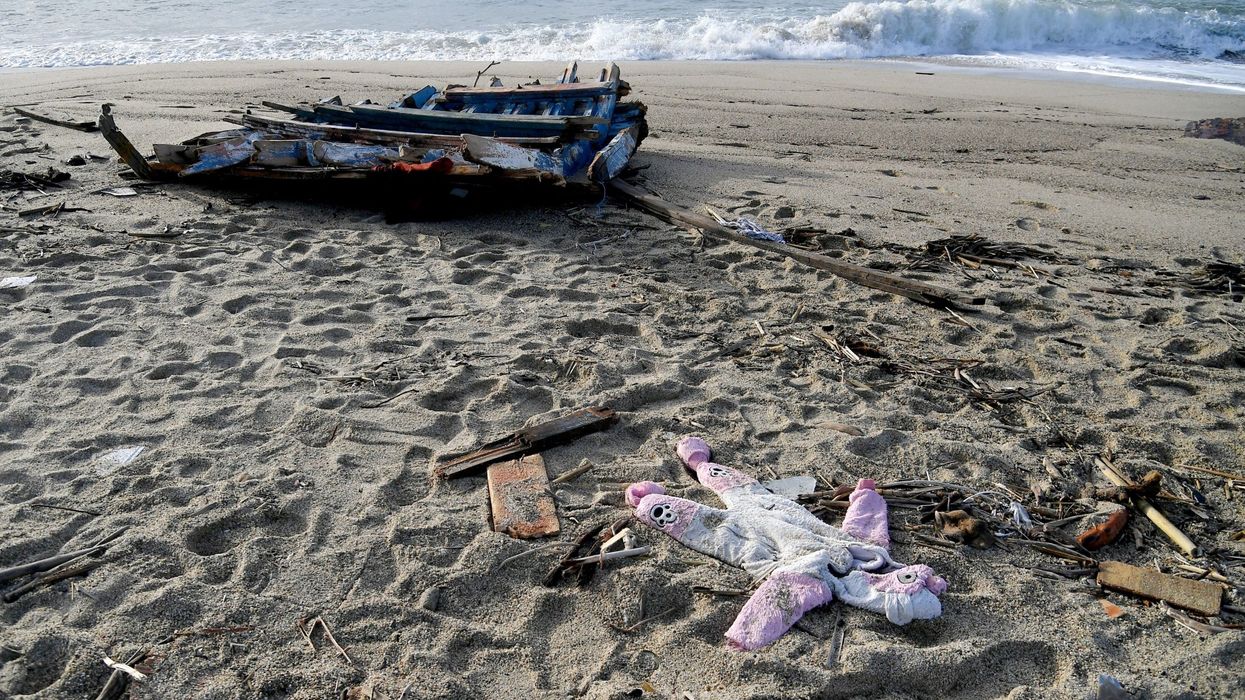ITALY arrested three men who they believe trafficked up to 200 people aboard a wooden boat that smashed apart on rocks off southern Italy last Sunday (26), killing at least 64 people, police said on Tuesday (28).
Lieutenant colonel Alberto Lippolis said a Turkish man and two Pakistani nationals had sailed the boat from Turkey to Italy despite the terrible weather and been identified by the survivors as "the main culprits of the tragedy".
"According to initial investigations, they allegedly asked the migrants for about 8,000 euros ($8,485) each for the deadly journey," said Lippolis, commander of a finance police team in the region of Calabria. "All three have been arrested."
The boat hit rocks and broke up early last Sunday in heavy seas near the town of Steccato di Cutro on the toe of Italy.
Rescuers pulled a dead man from the sea on Tuesday (28), bringing the number of bodies retrieved so far to 64, including about 14 children. There were 80 survivors, who said that the boat had been carrying between 150 to 200 migrants.
"We will carry on searching ... the sea until we are certain that we have found everyone," said Rocco Mortato, a member of the underwater diving team of the fire brigade.
The boat had set sail from the port of Izmir in western Turkey towards the end of last week. Rescuers said most of the migrants came from Afghanistan, with the others from countries including Iran, Somalia and Syria.
Pakistan's foreign ministry said 20 of its citizens had been on the boat, and 16 of them had survived but four were missing.
A Pakistani official tasked with fighting human trafficking said the number of people trying to leave Pakistan was growing because "of the deterioration in the economic situation and lack work."
The official said on condition of anonymity that there were an estimated 40,000 Pakistanis trying to enter European countries each year.

The Save the Children charity said on Twitter it was supporting survivors from Afghanistan, Pakistan, Somalia and Syria, including 10 minors who had been travelling with their families.
"There are many missing minors," it wrote.
Sergio di Dato, head of the Doctors Without Borders (MSF) team offering psychological support to the survivors, said there were cases of children orphaned in the disaster.
"One Afghan 12-year-old boy lost his entire family, all nine of them - four siblings, his parents and other very close relatives," he told journalists.
At Le Castella, where a 15th-century fortress dominates the shoreline, an AFP journalist witnessed the coastguard recovering the body of a woman who looked to be in her early 20s.
Local officials said the search was ongoing for around 20 people still believed missing, though survivors have given differing versions as to how many people were originally on the boat.
Forensic police set about identifying the victims, issuing an email address to which relatives searching for loved ones could send distinguishing details, from eye and hair colour to tattoos or piercings.
The tragedy has fuelled a debate on migration in Europe and Italy, where the recently elected right-wing government's tough new laws for migrant rescue charities have drawn criticism from the United Nations and others.
Italian prime minister Giorgia Meloni said in an interview on Monday (27) that she had written to European Union institutions calling for immediate action by the bloc to stop migrant boat trips so as to prevent more deaths.
"The more people depart, the more risk dying," she told RAI public television. "The only way to tackle this issue seriously, with humanity, is to stop the departures."
Meloni's government pushed through a controversial law last week that forces migrant aid charities to perform only one life-saving rescue mission at a time before heading directly to ports, which are often far away.
Critics say the measure violates international law and will result in more people drowning.
Hundreds of thousands of migrants have reached Italy by boat over the past decade, fleeing conflict and poverty back home.
The United Nations Missing Migrants Project has registered more than 20,000 deaths and disappearances in the central Mediterranean since 2014, including more than 220 this year, making it the most dangerous migrant route in the world.
(Agencies)




